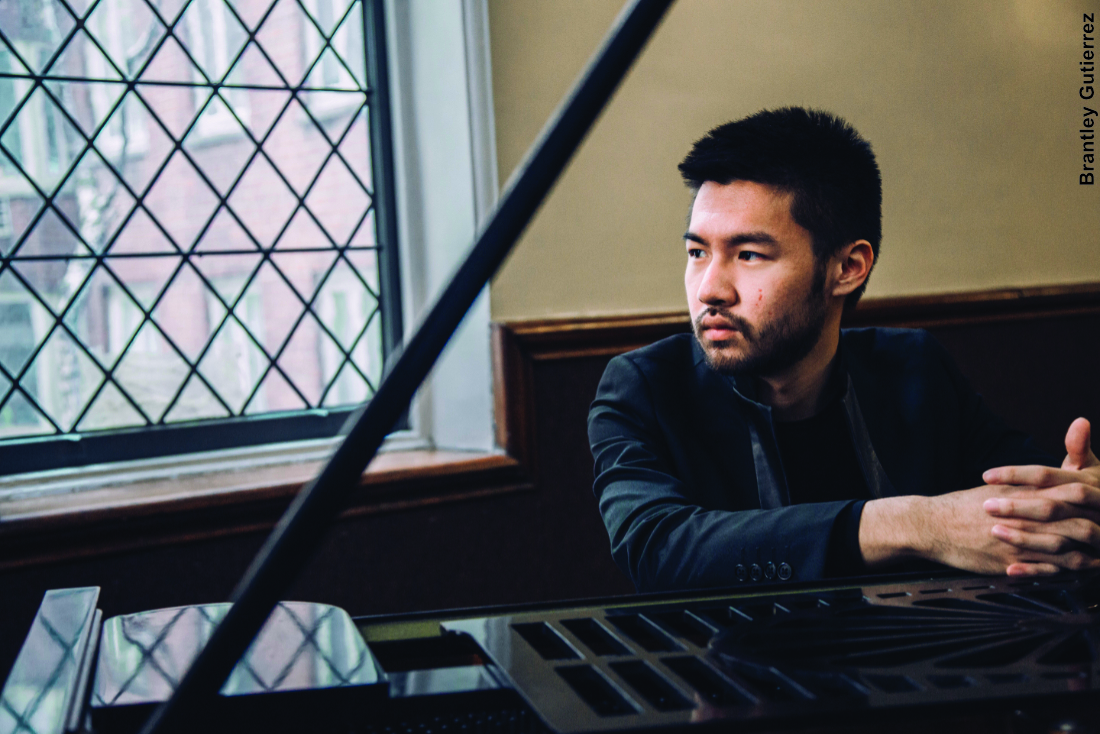Praised as “the kind of musician who is shaping the future of classical music” by New York Magazine, and as an artist of “probing intellect and open-hearted vision” by The New York Times, Conrad Tao has appeared worldwide as a pianist and composer.
Tao has performed as a soloist with the leading major orchestras, and as a composer, his work has been performed by orchestras throughout the world including the world premiere of his first large-scale orchestral work, Everything Must Go by the New York Philharmonic.
In his first performance on our stage, Tao’s program will include Brahms, Ravel, and David Fulmer.
This concert is generously co-sponsored by Howard and Celestine Campbell.
Johannes Brahms (1833–1897)
Six Pieces for Piano Op. 118 No. 1
Intermezzo in A minor. Allegro non assai, ma molto appassionato
David Fulmer (b. 1981)
I have loved a stream and a shadow (With glitter of sun-rays, Nor with stars stretched, nor looking back to heaven…), I
Johannes Brahms (1833–1897)
Six Pieces for Piano Op. 118 No. 2
Intermezzo in A major. Andante teneramente
Johannes Brahms (1833–1897)
Six Pieces for Piano Op. 118 No. 3
Ballade in G minor. Allegro energico
Johannes Brahms (1833–1897)
Six Pieces for Piano Op. 118 No. 4
Intermezzo in F minor. Allegretto un poco agitato
Todd Moellenberg
Leg of Lamb (after Bernadette Mayer)
Rebecca Saunders (b. 1967)
Mirror, mirror on the wall
Johannes Brahms (1833–1897)
Six Pieces for Piano Op. 118 No. 5
Romanze in F major. Andante
I N T E R M I S S I O N
David Fulmer (b. 1981)
I have loved a stream and a shadow, II and III
Maurice Ravel (1875–1937)
Gaspard de la nuit
I. Ondine
II. Le Gibet
III. Scarbo
Johannes Brahms (1833–1897)
Six Pieces for Piano Op. 118 No. 6
Intermezzo in E♭ minor. Andante, largo e mesto
Program subject to change.
Johannes Brahms (1833-1897)
Six Pieces for Piano, Op. 118
Johannes Brahms maintained a close relationship with Robert and Clara Schumann for most of his life. As a young man, the Schumanns supported his compositional efforts and regularly programmed his works alongside their own. After Robert was committed to an asylum, Brahms would pass him messages from Clara and vice versa. The Six Pieces for Piano were published in 1893 as a set. Brahms dedicated this work to Clara Schumann, his lifetime friend and collaborator. He would only publish one more work for solo piano before his death in 1897.
The first of the six pieces is titled Intermezzo, as are the second, fourth, and sixth pieces in this set. Normally an intermezzo would appear in between two larger sections of music, so it is curious that Brahms would begin the set with this formal device. The third and fourth pieces are titled Ballade and Romanze, respectively. The term ballade comes from a type of old French poetic verse that evolved to suggest a single-movement piano piece reminiscent of the romantic songs that grew from this poetic form. Similarly, a romanze is a relatively short piece of music that reflects personal sentiments rather than a precise formal layout.
David Fulmer (b. 1981)
I have loved a stream and a shadow (With glitter of sun-rays, Nor with stars stretched, nor looking back to heaven…)
American conductor, composer, and violinist David Fulmer studied composition with Milton Babbitt and violin with Robert Mann at The Juilliard School. In 2016 he won the Koussevitzky Award and a Guggenheim Scholarship. Fulmer has served as Music Director of the Hunter Symphony since 2017 and has appeared as guest conductor for orchestras all around the world.
The title for this work is inspired by the American expatriate and poet Ezra Pound. He was immensely influential for writers like Ernest Hemmingway and Robert Frost. (Unfortunately, Pound was also a collaborator with the Fascist government in Italy under Mussolini as well as the Salò Republic, or the Nazi puppet state in Italy that was established towards the end of the Second World War.) The line “with glitter of sun-rays, nor with stars stretched, nor looking back to heaven…” comes from a 120-section poem called The Cantos, which he wrote over the course of nearly four decades. In total, the poem is nearly 800 pages long. Fulmer’s work is incredibly free in terms of its rhythmic and harmonic content, but it is broken down into three distinct sections labeled I., II., and III.
Todd Moellenberg
Leg of Lamb (after Bernadette Mayer)
Todd Moellenberg is a pianist, composer, and poet based in Los Angeles. He regularly interprets the works of Ligeti, Stockhausen, Grisey, and Boulez. Moellenberg completed a DMA in contemporary piano performance at UC San Diego under the tutelage of Alex Karis. His research focused on repetition and fixation in the music of Ravel, Barraqué, and his own compositions. Moellenberg draws heavily from avant-garde musical and poetic traditions in his original compositions.
This work is inspired by the poem “Leg of Lamb” written by the NYC-based poet Bernadette Mayer. In this poem, Mayer explores the nature of poetry, comparing it to a prism that scatters and reorganizes words rather than light. Similarly, the music in this piece repeats, but each repetition is refracted and reorganized such that the material always sounds fresh. The complex rhythms of this piece demonstrate Moellenberg’s academic interest in 20th century modernist composers.
Rebecca Saunders (b. 1967)
Mirror, Mirror on the Wall
Rebecca Saunders is a London-born composer who lives and works as a freelance artist in Berlin. In 2019 The Guardian ranked her work Skin (2016) as the sixteenth greatest piece of art music written since the year 2000. Saunders completed a PhD in music composition at the University of Edinburgh in 1997. She has won several composition prizes worldwide, including the Busoni Prize and the Hindemith Prize. Saunders has composed works for world-renowned ensembles including the Arditti Quartet and the BBC Symphony Orchestra.
This work for solo piano was commissioned by the Welsh College of Music and Drama. The piece is full of equally spare and dense harmonic structures. Saunders calls on the pianist to use extremely precise pedaling. Rather than the focus be on technical virtuosity, Saunders requires that the performer accentuate the subtle differences in texture and dynamics throughout the piece.
Maurice Ravel (1875-1937)
Gaspard de la nuit
I. Ondine
II. Le Gibet
III. Scarbo
Maurice Ravel is a defining figure of early 20th century French art music. Though he is often lumped together with other composers like Debussy as an Impressionist, Ravel and his followers were quite resistant to the term. His later music bears the influence of jazz, which he explored in depth towards the end of his life. Ravel was a relatively slow composer, and his piano output is nowhere near as prolific as some of his contemporaries. The keyboard works he did publish are demanding, beautiful pieces of music.
Gaspard de la nuit is one of the most difficult pieces of piano music written in the early 20th century. “Gaspard” is derived from the original Persian word referring to a man in charge of royal treasures. The three movements of the piece are based on fantasies from a collection of poems written by Aloysius Bertrand titled Gaspard de la nuit – Fantasies á la manière de Rembrandt et Callot. The first movement, titled Ondine, is about a sea nymph who tries to seduce her observer into visiting her kingdom at the bottom of a lake. The second movement, Le Gibet, presents the viewer with a desert sunset. The corpse of a hanged man is illuminated by the deep golden rays of the sun. The third and final movement, Scarbo, depicts a night goblin pirouetting and disappearing into the darkness, only to reappear suddenly.
Conrad Tao
Conrad Tao has appeared worldwide as a pianist and composer and has been dubbed “the kind of musician who is shaping the future of classical music” by New York Magazine, and an artist of “probing intellect and open-hearted vision” by The New York Times. Tao has performed as soloist with the Los Angeles Philharmonic, Chicago Symphony, Cleveland Orchestra, New York Philharmonic, and Boston Symphony. As a composer, his work has been performed by orchestras throughout the world; his first large scale orchestral work, Everything Must Go, received its world premiere with the New York Philharmonic, and its European premiere with the Antwerp Symphony, and he was the recipient of a 2019 New York Dance and Performance “Bessie” Award, for Outstanding Sound Design / Music Composition, for his work on More Forever, in collaboration with dancer and choreographer, Caleb Teicher. He is the recipient of the prestigious Avery Fisher Career Grant and was named a Gilmore Young Artist—an honor awarded every two years highlighting the most promising American pianists of the new generation.
In the 2022-23 season, Tao returned to perform Mozart with the New York Philharmonic, for whom he curated a program for their Artist Spotlight series, featuring collaborations with vocalist, Charmaine Lee, and wind ensemble, The Westerlies. He also returnd to the San Francisco Symphony both as a soloist in Gershwin’s Concerto in F major at Davies Symphony Hall, and as a curator for their Soundbox series. In Washington, DC, he made his debut with the National Symphony Orchestra performing Shostakovich with Dalia Staveska, and, following Atlanta Symphony’s premiere of his Violin Concerto with Stefan Jackiw in 2021, he appeared as soloist with the orchestra performing Ravel with Ryan Bancroft. After their successful collaboration with the Finnish Radio Symphony, Tao further re-united with Hannu Lintu to perform Tchaikovsky with the Naples Philharmonic, as well as returned to Finland to open the season with the Tampere Philharmonic and Santtu-Matias Rouvali.
In his first collaboration with the St. Paul Chamber Orchestra this Fall, Tao will curate and lead a program of music by Ruth Crawford Seeger, Gesualdo, CPE Bach, Feldman, and Mozart. Other upcoming collaborations include ongoing performances of Counterpoint with dancer Caleb Teicher, and performances of Gershwin’s Rhapsody in Blue with Orchestra of St Luke’s, as part of Paul Taylor Dance Company’s season at Lincoln Center. The season will also include a multi-city tour with the Junction Trio, which includes the group’s Celebrity Series of Boston debut, alongside performances in New York City, San Francisco, Washington DC, and more.
In the 2021-22 season, Tao opened Lincoln Center’s Mostly Mozart with Louis Langree at Damrosch Park performing Mozart, Gershwin, and William Grant Still. He also returned to perform with Jaap van Zweden and the New York Philharmonic at the Bravo! Vail Festival and appeared with the Chicago Symphony performing Ravel at the Ravinia Festival. Further orchestral engagements included Ravel with Cincinnati Symphony; Rachmaninov’s Concerto No.4 with the Kansas City Symphony; and Tao’s own composition, Spoonfuls, with the New Jersey Symphony. In the same season, Tao also made solo recital debuts at London’s Wigmore Hall, Seattle’s Meany Center, and Celebrity Series of Boston, and also gave recitals in New York, Washington, and other cities throughout North America. Tao’s violin concerto, written for Stefan Jackiw, was premiered by the Atlanta Symphony under Robert Spano, and the Baltimore Symphony under Kirill Karabits. His recent performances also include multi-concert residencies with the Finnish Radio Symphony and the Swedish Radio Orchestra, and Gershwin’s Rhapsody in Blue with the Santa Caecilia Orchestra and Antonio Pappano.
A Warner Classics recording artist, Tao’s debut disc Voyages was declared a “spiky debut” by The New Yorker’s Alex Ross. Of the album, NPR wrote: “Tao proves himself to be a musician of deep intellectual and emotional”. His next album, Pictures, with works by David Lang, Toru Takemitsu, Elliott Carter, Mussorgsky, and Tao himself, was hailed by The New York Times as “a fascinating album [by] a thoughtful artist and dynamic performer…played with enormous imagination, color and command.” His third album, American Rage, featuring works by Julia Wolfe, Frederic Rzewski, and Aaron Copland, was released in the fall of 2019. In 2021, Tao and brass quartet The Westerlies released Bricolage, an album of improvisations and experiments recorded in a small cabin in rural New Hampshire in June 2019.
Tao was born in Urbana, Illinois in 1994. He has studied piano with Emilio del Rosario in Chicago and Yoheved Kaplinsky in New York, and composition with Christopher Theofanidis.




